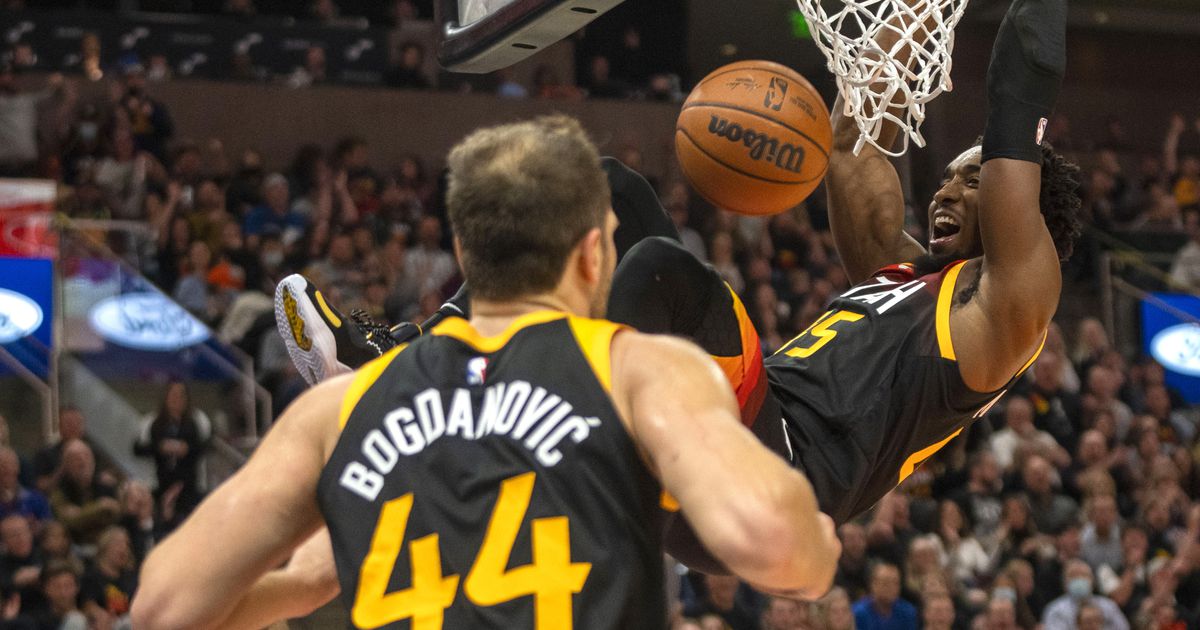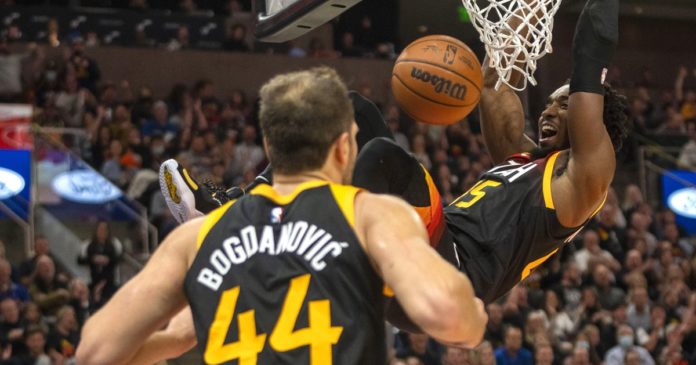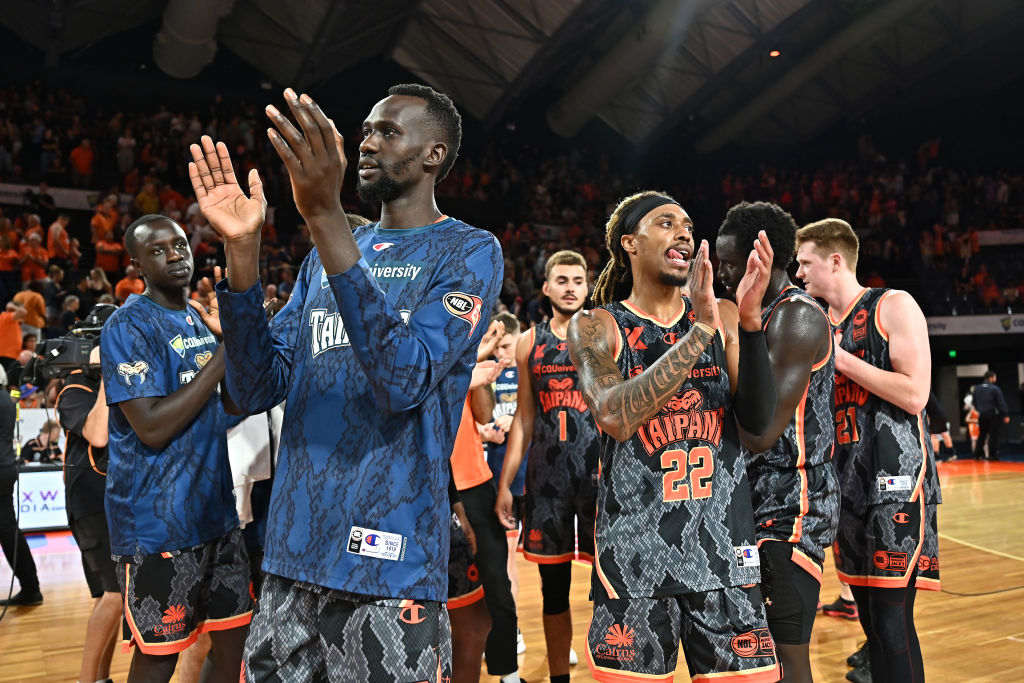
It’s not hyperbole to say that the first 20 games of the Utah Jazz’s 2021-22 season have been a sometimes-joyless affair.
Despite holding the league’s top-rated offense, players have consistently noted that it nevertheless doesn’t feel right. They’ve increasingly encountered opponents eschewing drop-big defenses in favor of 1-through-5 switching, and the Jazz have increasingly resorted to ball-stopping isolation to counter it. They’ve been guilty of waning focus and inconsistency of effort, allowing foes to either rally back from deficits or to linger far longer than they should and stay within striking distance.
The nadir came in Friday’s home loss to the young and short-handed and frankly not very good Pelicans — a game defined by low energy, lack of urgency, and an alarming amount of “me first” play. It was their second one-point loss to an inferior foe in a span of five days, following Monday’s defeat vs. Memphis.
The aftermath was riddled with sad-eyed, low-voiced proclamations of doom and gloom if things didn’t change soon.
“We’re letting a lot of games slip away that we should win, and at the end of the season, we’re gonna feel stupid,” said Rudy Gobert. “We’re gonna look at the schedule and some of these games and we’re just gonna regret that we didn’t keep playing the right way or close out on those games.”
“It doesn’t look good, it doesn’t feel good. It starts with ball movement, turnovers, transition. The efficiency is just not great right now,” added Donovan Mitchell. “And this [expletive]’s happened twice in a week — games we should have won.”
“We’ve established an identity with this team, and we don’t look like that team,” concluded coach Quin Snyder. “We know how we need to play — it’s just a question of executing it.”
No one doubts that. The team, after all, has certainly beaten that theme into the ground after seemingly every loss this season.
If you know what you need to do, quit talking about it and just do it! has come the frequent refrain on social media from perturbed supporters.
Fair enough.
In Saturday’s rematch against New Orleans, at least, the Jazz did. The inefficient and ugly isos gave way to moving the ball — throwing it ahead, swinging it side to side — and, as a result, an avalanche of made 3-pointers. Defenders hustled back to shut down transition opportunities. Focus was maintained and killer instinct was flexed, as the lead escalated to 20, 30, 40 points.
That night’s postgame was not marked by jubilation over the blowout, but by determination to start stringing together more consistent performances — for more minutes of each game, and for more games in the season.
“We’ve had games where we would do it for a couple possessions, but when we’re really good, we do it the whole game,” said Mike Conley. “Everybody really fed off each other [Saturday]. … Hopefully we take a lesson from that, just being able to go out there and play for each other and sacrifice and see what kind of rewards we get from that.”
“The things that were different tonight than last night are the things that we need to have focus on, and continue to make them important, no matter who we’re playing, whatever the score is,” added Snyder. “… That’s something that we have to continue to cultivate.”
He noted that on Saturday, the team’s “focus was on the group,” manifested in a variety of small but meaningful ways — players shifting their spacing a bit to create better driving and passing lanes; throwing the ball ahead more to put the opposing defense on its heels; running harder in transition.
“All the things that I know we know how to do, but we just have to make them important,” he said.
Conley concurred, saying it was imperative that Utah’s players “wean out bad habits and work on the small things that can make us a better team” — boxing out, playing more uptempo, getting back in transition, and committing to finding the open man.
Ball movement and passing have been particularly problematic of late for Utah. On Friday, they assisted on just 17 of 36 baskets, and scored 97 points; on Saturday, they had 24 dimes on 45 buckets and dropped in 127 points.
Everyone was cognizant of the need to improve in that regard. Jordan Clarkson recalled checking into the game, having Mitchell throw him the ball on the wing, and being seized by an almost instantaneous desire to shoot — even as Brandon Ingram closed in on him — before almost just as instantaneously realizing it would be a bad shot.
“I was like, ‘Nah. No, no, no. We can’t do that right now.’ So I swung it to Rudy Gay, and then Rudy Gay’s flowing into his shot, and he knocked down a 3. Sometimes we just gotta pass up those shots to make those next ones,” Clarkson said. “… When it’s flowing, the ball’s just circling around everything, everybody’s touching it, and everybody just feels more comfortable when it happens. It’s gotta be something we’re more conscious of.”
That learning process has been too slow and too infrequent this season.
Conley pointed out Saturday that “a lot of teams have adopted what’s worked against us in the past from other teams we’ve played in playoff series. Their tendency is try to stop the ball, to keep it within two or three guys’ hands, or one or two guys’ hands, and make us win that way.”
That dovetailed off Gobert’s scalding, scathing critique from Friday: “I don’t know how many times we’re gonna have to lose in the playoffs — I might be 30, I might be 40 by then — I don’t know how many years we’re gonna keep losing in the playoffs and not learning from it. We’re doing the same stuff over and over and over. Hopefully we grow. Hopefully it hurts enough that we put our egos aside and we grow and play as a team.”
For what it’s worth, the players have proclaimed that, regardless of perception, such trends and the defeats they spawn eat away at them, too.
“Shoot — when we lose, it sucks. We all really care, and we care about each other. So it really sucks when we lose,” said Clarkson. “… I don’t even know how many games we’ve lost. Seven? Yo, those seven games feel like the worst thing that’s ever happened to us in the world. But what it’s causing us to do is just lock in and figure it out.”
It all sounds good, but then again, fans have heard it all before — an acknowledgement of what’s gone wrong, professed resolve to get it turned around, momentary commitment to exactly that, and then falling back into the same old patterns. Lather, rinse, repeat.
The Jazz know that. And say that it weighs on them. And insist they will take the necessary steps to get it right.
After all, no one likes joyless basketball.
“In the huddle [Saturday], we were just like, ‘Man, just have fun.’ Everybody is so tight and stressed. We all want to do the right thing. But we weren’t having fun in the way we were last season,” said Conley. “Tonight was more of that atmosphere, where guys were just being selfless and running and boxing out. Guys were cheering for the smallest things, like diving on the floor. That stuff, we lacked the last few weeks or so.”








